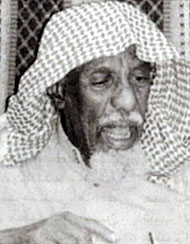RIYADH, 5 February 2005 — “Satan’s horse” is not a myth. As narrated by an elderly Saudi, it is the name local residents of Buraidah, Al-Qasim, used to call a bicycle some 47 years ago at a time when new inventions were unacceptable to the majority of people there and ignorance prevailed.
In the 1940s and early 1950s, ignorance made people reject anything new, particularly a device of any sort. History tells us that many Saudis rejected the telegram, the radio, the car and other inventions that the late King Abdul Aziz, the founder of the Kingdom, was keen on using to be in tune with the times and to serve his people.
Ali Al-Mirdasi, a resident of Khab Algabr in Buraidah, is the first Saudi to receive permission to ride a bicycle in his area.
Speaking to a local newspaper, he said that he first received state permission to ride his bicycle some 46 years ago when he was 25.
“My father bought me the bicycle so that my brother Ibrahim and I could complete our studies at the evening school. He was keen on getting me the license to ride the bicycle,” he told Al-Riyadh newspaper.
“The commission for Promotion of Virtue and Prevention of Vice — locally known as the Mutawaa and known then as the “Nuwwab” — banned people from riding bicycles. The permission I received from them was a statement written on one of their official documents saying that, ‘since Ali Al-Mirdasi needs to ride his cycle from Khab Algabr to school, we have given him permission to ride his cycle from that area to his school.’ And it had their official stamp,” he said.
He said that there were certain conditions for receiving a permission from the religious police, but said his father, who worked as a member in the commission itself, helped in getting the document from the state body.
Asked why he thought the religious body banned people riding bicycles at the time, Al-Mirdasi said the Nuwwab “prevented anyone from riding cycles because it was alien to our society. During that time it was called ‘Satan’s horse’. And from what I understood, the ban was on everyone in the general public.”“Permission was only given to me to take a certain route which is from my house in Khab Algabr to school and back only,” he said.
“Those who rode bicycles without permission were punished by having their cycles confiscated and being flogged five times with a stick,” he added.
Al-Mirdasi said that during the time there were no local traffic police or police stations and that his father bought the bicycle for him from someone who purchased it and had it stored, but never used it due to the public ban. “The punishment of riding it was confiscation and flogging, so who would have dared to ride it,” he wondered.
He also said that even though he was granted permission, he was still not quite accepted by the public for riding a bicycle.
Al-Mirdasi said that the brand name of his bicycle was “Phillips”, and that he kept it for ten years. During that period he used to keep it inside the school premises so it would not be harmed or stolen.
He added some extra fittings to the bicycle such as battery operated decorative lights. “But I later took them off because they used to consume a lot of batteries which was not always available,” he added.
The distance from his home to school was 15 minutes as there were no traffic lights or cars to crowd the road. “The only obstacle on my way to school was a stretch of land that was full of sand. My brother and I took turns pushing the bicycle over it to the other side,” he said.
“After I got the permission from the commission I had no trouble from anyone in the public. In fact, people started to look up to me with respect and admiration,” he commented.
One funny incident he remembers was when he and his brother were caught by members of the commission at night when they had left night school and were on their way back home. The commission people asked them what their purpose was to come out at that time, and what they were doing at the far end of the town. When they revealed their names and informed them that they were sons of their colleague and that they were on their way home from night school, they let them go, but “only after having us make a written commitment that they would never be late to return home again even though this happened just after Isha prayers”.
Al-Mirdasi said the rationale behind the ban was “society’s fear for anything new and because society was not opened up to others.”
“Today’s youth should be grateful to God for all the modern scientific inventions they can use. They enjoy so many modern tools and other things that we in our times could not,” he said.


